- Home
- Andrew McGahan
The War of the Four Isles Page 3
The War of the Four Isles Read online
Page 3
Dreadful cries came across the ocean, the opposite of the jeers that had been hurled at Dow and his crew moments before – these were entreaties of purest terror and pleading. And a part of Dow would willingly have responded, for it no longer mattered that these were Ship Kings and the enemy; they were fellow sailors, trapped in the most awful of ways.
But his boat was crippled. And even if it hadn’t been, he still would not have dared to draw closer, for it would mean only the certain death of his own crew. Likewise, the Ship Kings boats made no effort to go to their comrades’ aid. They only floated upon the flat sea – their oars limp, their muskets lowered – and watched the terrible event.
The Revenge’s hull was almost all white now, and great nets of rope were stretched over the main deck and the lower rigging – only the upper masts and sails stood free. But the crew was mostly unharmed, and beneath the netting there remained open spaces, and below decks too would still be clear. Men could still walk about, and eat and drink from the ship’s supplies, and stare out at the sea . . .
But they could never leave.
‘Help us!’ came more cries, and figures waved desperately, imploring. But the Ship Kings boats began to back away – and Dow’s boat too, his crew having unpacked their emergency oars at last.
No one dared linger, for the strands in the water were still writhing in search of new victims. No seafarer had ever gazed upon the actual body of a Rope Fish, but all could feel that beneath them a vast amorphous thing hung in the middle depths, perhaps with great stalked eyes staring up as its tendrils groped for the deadly buoyancy it sought – and which, once found, it would never release.
Was the warm breeze strengthening? It seemed so to Dow. And with a macabre stateliness – because the upper sails of the Revenge were still set – the battleship was now moving off again slowly, dragging its captor with it. On the high deck officers could be seen struggling with the wheel, as if to steer the ship back towards the boats – even though those same boats would only flee before it – but in any case the rudder was bound tight in ropes and immovable. Still the officers fought on, unaware.
Dow turned away. All about, the smoke of cannon fire was clearing now and distant shapes were appearing through the murk. Off to the west he could see the three Twin Islands ships, all seemingly unharmed. Near to them was a smoking, half-sunken hulk that was the remains of one of the Ship Kings frigates. And away to the east were the two surviving enemy vessels. Whether out of fear of the Rope Fish, or because they were now outnumbered, they were not waiting to fight further but were making off towards the eastern horizon at full sail.
The battle was won.
But Dow felt no sense of triumph, for in the middle of the tableau the Revenge laboured forward with its now-eternal burden; so close to aid, and yet forever beyond all help. It was a sight so evil it shrivelled even victory into nothing more than a cold revulsion, and a useless pity.
And meanwhile, the Ship Kings boat that had been coming to capture him – itself now abandoned and alone upon the sea – rowed slowly toward the Sponge, the marines grim-faced, holding their muskets reversed, muzzle down in surrender.
*
What became of the Revenge Dow would never know. By the time all the Snout’s boats had been recovered, and the stranded Ship Kings prisoners collected and locked firmly away in the brig, he was able to catch only one last glimpse of the battleship.
It was dusk by then, and the Twin Islands fleet had begun to withdraw westward, while the Ship Kings vessels had long vanished east into the gloom. The field of battle was deserted – a darkening stretch of ocean no different from any other, except for a single ship that sailed there, dismally alone.
At a glance the Revenge looked almost unharmed – although settled somewhat heavily in the water. Only the whiteness about its hull, and the confusion of its lower rigging, betrayed its afflicted state. That men still lived upon it was in no doubt, for fire burned brightly on the main deck as the evening came on, as if the crew were attempting to destroy the tendrils with flame – an idea that had been tried before, according to the legends, to no avail.
And even though the doomed ship was a good four miles off by then, Dow was sure he could still hear the cries of the mariners on board, despairing and damned, as they pushed slowly into the darkness of their first night – the first only of many – in their floating coffin.
Then at last the gloom swallowed them up, and whatever their fate, or how long they endured within the Rope Fish’s clutches before the ship broke apart, or before the men all slew themselves, was a matter beyond the knowledge of the living.
2. NEWS FROM THE ENEMY
There was no reading lesson the next day. Cassandra was otherwise occupied. So when Dow came off duty mid-morning, he retired to his cabin and tried to sleep; but the day was as hot and airless as the three before it, and sleep would not come.
But it was more than just the heat. An ill temper had descended upon him, a restless dissatisfaction; it happened periodically, though it was some time now since the mood had last struck. No doubt it had been precipitated by the events of the day before. The fighting, the threat of capture, then the lingering horror of the Revenge. . . and yet for all its drama, what had any of it really mattered? The fate of one or two ships, and a handful of boats . . . it meant nothing in the larger picture of the war.
What, in short, was he doing here? Why was he marking time in this backwater, while elsewhere, great battles decided the fate of the world?
New Island. That was where the war was being fought. And he was a New Islander! His own homeland was the crux of the entire conflict, and he, the most famous of his countrymen, was idling uselessly here thousands of miles away across the sea.
It was shameful.
The fact that these were old thoughts, that he had brooded over the same questions time and again ever since he had been posted to the Snout, did not lessen that shame. Sometimes Dow could put it to the back of his mind. But at other times, as now, it tormented him like a physical pain.
So when there came a knock at his door in the early afternoon, it found him wide awake, hot, and in bad humour. He climbed out of his bunk, took the single step across the tiny cabin to the door and flung it open impatiently. ‘What?’
It was Cassandra. She met his uncivility with only a raised eyebrow. ‘You’re wanted in the Great Cabin.’ She assessed him up and down, amused. ‘When you’re decent.’
Dow had stripped because of the heat; at another time he might have laughed, but now he only grabbed at his clothes furiously and began to dress. ‘What about?’
‘It’s these prisoners of yours from yesterday,’ she replied, watching him unabashed. ‘Jake has just about finished with their interrogation.’
Dow gave her a sour look. She and Jake had been at work with the prisoners since the night before. The questioning would not have been a gentle affair, he knew, and Cassandra would not have been merely an idle observer. If there were secrets to be revealed, then it was a laundress’s business to learn those secrets and report them back to her mistresses.
‘And?’ he prompted.
‘And now one of them is demanding he be allowed to meet with you. It’s their commander, in fact, a sergeant of the marines.’
‘Demanding?’ Dow queried.
Cassandra shrugged. ‘He bargains with us. He’s tougher than the others and has told us little so far, even under Jake’s ministrations. But he’s heard rumour – from our own crew, most likely – that the famous Dow Amber is on board this ship. He says that if he’s allowed to see you face to face, then he’ll be more cooperative.’ In response to Dow’s frown, she added, ‘He’ll be bound, and quite incapable of attacking you, should that be his plan. The captain and Jake see no harm in playing it out.’
Dow still didn’t like the idea – he’d never been comfortable around Ship Kings marines, even when serving on board the Chloe – but only reached moodily for his shoes. ‘The crew shouldn’t be talking about
me to Ship Kings, prisoners or not.’
The laundress leaned on the doorframe. ‘Of course they’re talking about you! They always do. They’re proud of you, proud to have you on their ship. You should hear what they’re saying about yesterday; that a dreaded Rope Fish came especially to the Young Admiral’s rescue. Came to his call, even.’ Dow gave her another unhappy look, but she only smiled. ‘Well, the Fish did come, didn’t it? You can’t deny that. And there’ll be no stopping the story now.’
And Dow knew she was right – that indeed she would spread the story herself, by reporting it to her mistresses. Just as she had reported his every other action over these last years, so that it could be disseminated across the Twin Isles fleets; tales of every skirmish he had fought in, every minor encounter, but always exaggerated and enlivened, and his part in it turned somehow heroic. It was pure myth-making; and though Dow knew it was done only to boost Twin Islands morale, still he hated it.
‘I didn’t summon anything,’ he snapped, ‘and you know it. And if it’s a story you want, then why not send me to fight in a real battle?’
Her eyes widened, recognising that he was genuinely angry. ‘You know perfectly well why not! You’re too important to risk. Too many ships get sunk in those big battles, and too many sailors are lost without trace. It would be a disaster if Dow Amber was to simply vanish, missing in action. It’s bad enough even having you out here on patrol – but you did insist on serving with the fleet.’
But Dow was in no temper to be mollified by the old excuses. ‘I insisted on serving because I thought I’d be helping to liberate New Island; it wasn’t to do this! If I can’t be any use at sea, then the high command should at least do what they promised and let me go home and join the fighting on land!’
‘I know what you were promised – and it will happen, Dow.’ Cassandra’s expression had gone deadly earnest. ‘But not yet! New Island is too insecure. If we send you too soon, and you fall in the fighting there or get captured by the Ship Kings, it would devastate your countrymen. Your greatest use to them now is to be a source of inspiration. The mere fact that you’re alive and resisting the Ship Kings is what matters. Your people trust you will come when you can. But if you throw your life away out of reckless impatience, you’ll only end up betraying that trust.’
‘So now I’m wrong for wanting to fight for my own homeland!’ Dow noted bitterly.
‘No . . . just short-sighted. And a bit selfish, if you really want to know.’
That stung, but he pressed on, the anger still bright. ‘What about my parents then? My brother and sisters? Am I supposed to just forget them? I didn’t argue when your mistresses told the whole world about Honous Tombs and the rest of it – but you know what that means; the Ship Kings know I have a family now, and if they can’t get to me, they’ll be hunting for them!’
‘Your family is watched and guarded. I’ve told you a thousand times. They are safe and will stay safe. You don’t have to worry about them.’
‘Easy for you to say.’
Something flashed in her eyes – pain, anger – and Dow felt instant regret. It was a terrible thing to suggest to her. Cassandra, as he knew full well, was an orphan; her father had died before she was born, and her mother when she was only a child. She had been raised instead by the Order of Laundresses.
‘Sorry,’ he got out.
She shrugged it off, addressed him earnestly again. ‘Listen to me, Dow. It is exactly for your family’s sake that you must stay away from them. The Ship Kings on New Island have other things on their mind at the moment; your family is not a priority. But if you showed up there, that would quickly change. Staying away is actually the wisest and bravest thing you can do for now. It’s not cowardice, as you seem to think. It’s the opposite. It’s hard, but it’s right. You’ve no idea how much I admire your restraint.’
‘Well it’s run out!’
‘Just hold on a little longer. Please. Your time is coming. This summer just gone may well have been the turning point on New Island; there are immense plans for next year. Decisive plans. But if you try to return too early you’ll only destroy yourself and all those you love. Trust me on this. As your friend. As someone who understands. As someone who is on your side. Please.’
Her concern was too palpable to ignore, and Dow felt his anger failing, even as he strove to cling to it. Oh, he knew that laundresses were famously trained in manipulation, and that he should not trust Cassandra unguardedly. And yet of this much he was sure: she was pleading now not merely in obedience to her superiors, but for her own sake. She truly did care – and fear – for him.
The more difficult question, really, was this: how much did he care for her?
It was something he’d pondered increasingly of late. She’d served on the Snout as long as he had – indeed she was there only because of him – but it wasn’t until these last few months, with his promotion and his move into the officers’ quarters, that they’d begun to spend much time together; the reading lessons, for instance.
And he was intrigued, he couldn’t deny. It wasn’t that he’d lacked for female company when he’d been a common sailor; there were plenty of young women among the crew. But somehow he’d never become close to any of them; they all seemed too admiring and deferent – he was the great Dow Amber. It was off-putting. Cassandra, however, didn’t seem to see him that way.
Her clothes, too, marked her as different. All the other women on board wore standard uniforms, but Cassandra wore dresses; long, mottled in hue and fashioned from a patchwork of different materials. The style was meant to represent the rags of the humble washerwomen from whom the laundresses had evolved. But of course the rags weren’t rags anymore, but rather patches of silk and linen.
Then there was her hair. Most of the crew, men and women both, kept their hair short for practical purposes, but Cassandra’s was long, piled high into a chaotic blonde nest. Again, it was a style meant to signify something from the past, the careless heap into which a washerwoman might bundle her hair while she worked; but in fact it was the result of long and careful arrangement.
In addition to which, Cassandra was fully possessed of the mysterious sophistication that all laundresses displayed in some measure, bearers as they were of secret arts and skills. Her saving grace, from Dow’s point of view, and the one that stopped her from being too mysterious, or too beautiful, was that she was somewhat plump – even though she was taller than him – and that her round face was heavily freckled, and slightly snub-nosed.
But ah . . . that face. It haunted his thoughts at times. He’d never have predicted it, when he’d sat down at their first reading lesson. From a distance, he’d always been suspicious of her, so obviously assigned by the Twin Islands authorities to watch over him. And even when he’d found her to be good company in person – warm, knowing, quite unawed by his famous deeds but at the same time interested in them – he’d thought that at best they might enjoy a cool friendship; amicable, but wary.
But lately, when they were bent together over a desk reading or writing, he would be surprised by a sudden desire to clutch hold of her wild hair and then drag her mouth down against his own . . .
All of this and more rushed through Dow’s mind as Cassandra gazed at him in entreaty, and he knew he couldn’t refuse her. He bowed his head. ‘I’ll wait then,’ he sighed. ‘A little longer. Alright?’
Relief glowed in her. ‘Thank you.’
Dow nodded. ‘Well then, let’s go meet this sergeant of yours, and get it over with.’
But as he went to pass through the door, their heads came close together under the low ceiling, and he was suddenly conscious of the scent she wore, a scent not of the sea but of land, sweet and elusive. It was an essence, most likely, of some tropical flower or fruit from the jungles of Whale Island, a simple thing . . . and yet no other woman on the Snout smelled of it.
Their gazes met, and they leaned closer still, mouths almost brushing, but held apart, as if each was debating wh
ether this was really the time and the place, even if the outcome was inevitable . . .
Then the instant was gone.
Cassandra whirled away red-faced to stride off down the passage, flustered hands tidying her hair, and Dow followed after, a storm in his heart.
*
The captain and two of the ship’s senior officers were waiting for them in the Great Cabin.
Great Cabin. It was strange how the phrase always conjured in Dow memories of the Chloe. There were, of course, many differences between his first ship and his second. The Snout had only one gun deck, for instance, as compared to three on the Chloe, because the Snout’s two uppermost decks were devoted to the housing and maintenance of the all-important attack boats. And like all Twin Islands ships the Snout was square and squat and slow, no match for the Chloe’s graceful lines or speed.
But it was the Snout’s Great Cabin that always brought the difference home most forcibly to Dow. He recalled well the refinement and opulence of the Chloe’s grandest chamber. The Twin Islanders, however, building in haste in their secret shipyards, had no time for luxury. So the room that Dow and Cassandra now entered boasted no brass fittings, no leather couches, no windows of glass and golden filigree. Instead, the windows bore no glass at all, only wooden shutters, and aside from desks and shelves for the navigators, the only furniture was a long table, surrounded by plain wooden chairs.
At the table’s head sat the Snout’s commander: Captain Diederich Fletcher, a man as dour and squarely built as his ship. He was perhaps sixty years old, but solid and rudely hale for all that, his face a peppered red – from too much rum, truth be told – his salt-whitened beard hacked short, and his eyes narrowed to a querulous squint by years upon a glaring sea. All of which suited his temper, which was fiery.

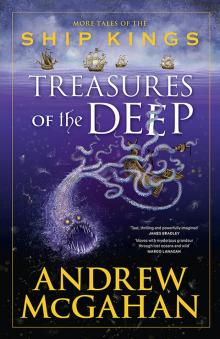 Treasures of the Deep
Treasures of the Deep The Rich Man’s House
The Rich Man’s House Praise
Praise The White Earth
The White Earth 1988
1988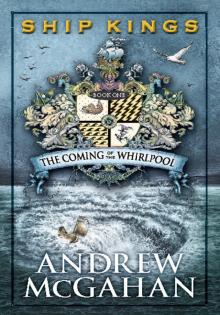 The Coming of the Whirlpool
The Coming of the Whirlpool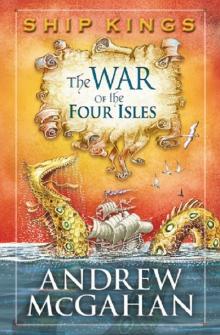 The War of the Four Isles
The War of the Four Isles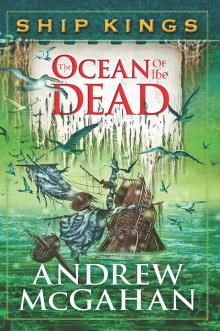 The Ocean of the Dead: Ship Kings 4
The Ocean of the Dead: Ship Kings 4 Last Drinks
Last Drinks Wonders of a Godless World
Wonders of a Godless World Underground
Underground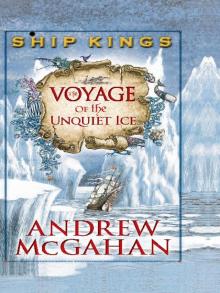 The Voyage of the Unquiet Ice
The Voyage of the Unquiet Ice